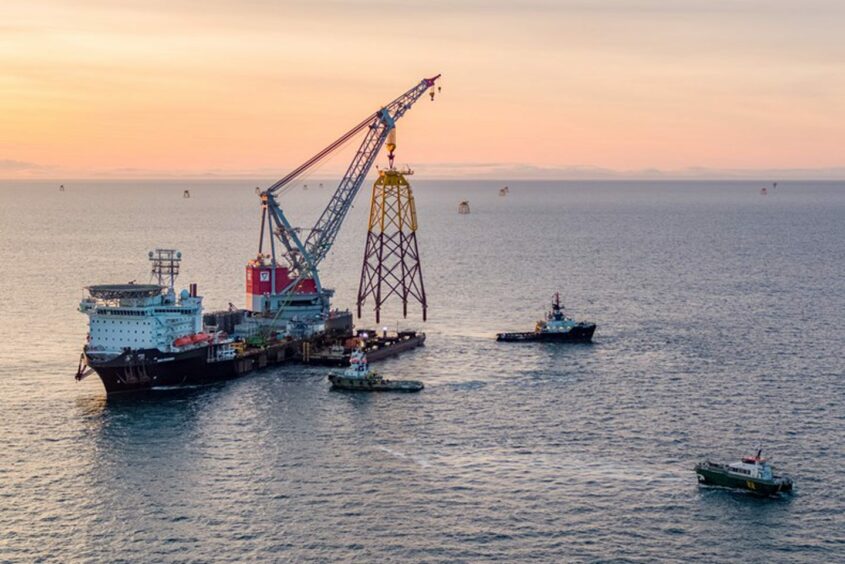
“Low morale” and a “culture of fear” have been cited as key barriers to the energy transition by a major new report, surveying more than 1,000 offshore workers.
Oil and gas workers from Aberdeen to Edinburgh and Newcastle participated in the study, highlighting reasons why many are concerned as to their prospects within the sector, amid what they describe as “relentless prioritisation” of companies’ profits.
The result of two years’ work, the “Our Power: Offshore Workers’” report has been compiled by pressure group Platform and Friends of the Earth Scotland, and backed by RMT, Unite and Uplift, to drive key demands for a just transition.
The study states that the promised boom in offshore wind and renewables cannot be modelled “in the broken image of the oil industry.”
It also calls for widespread changes to ensure workers can influence policy, claiming workers have so far been “left in the dark” over energy transition plans and are unable to visualise a future in the sector.
The report puts forward a ten-point list of demands from government which includes – among other things – a jobs guarantee, the creation of ‘offshore training passports’, public ownership of energy assets, a permanent ‘Energy Excess Profits Tax’ and a sovereign wealth fund.
They also called for stronger rights for workers via new protections and collective bargaining agreements.
These demands are “comprehensive in their scope, transformative in their scale, and deliverable now,” the authors said, and are presented alongside costed proposals and case studies aimed at illustrating how the changes could be enacted.
It follows a report last week from EY which warned of the dangers of winding down the oil and gas sector without adequate plans for transition.
Oil sector ‘hell bent’ on cutting costs
One of the Platform report’s major contentions is that the UK has not planned for a “managed phase-out of oil and gas production”, with the industry itself left to determine the “pace and structure” of the energy transition.
The report alleges existing plans do not involve workers and will “further dismantle their working conditions.”
In one testimonial, 53-year-old deck crew member ‘Matt’ – not his real name – said that even with high commodity prices, conditions were worsening for those in the offshore sector.
Despite what he described as “horrendous profits”, he said oil and gas companies were still “hell bent on cutting”, branding recent months as “the worst I’ve ever seen in my 32 years working in the industry.”
Oil and gas companies have been quick to blame the UK Government’s windfall tax, which they say has prompted more than 90% of North Sea producers to cut spending, with the policy “undermining” the country’s energy security and supply chain.
However, the findings come amid a growing wave of discontent, with Unite the union currently balloting around 1,300 of its members on industrial action across the North Sea in relation to various disputes, ranging from rotas to pay.
Another respondent, ‘Cameron’ – a 31 year old data engineer from Aberdeenshire – said the system in the UK is “in the toilet.”
“We’re hearing now that the likes of Shell and BP are making huge record profits, and for the guys down the line it’s just not filtering down. It feels like corruption of the highest order.
“I don’t see how they can be paying people less in 2022 than in 2014. It’s obscene.”
Responding to the report’s findings, Offshore Energy UK’s sustainability and policy director Mike Tholen said: “The UK offshore oil and gas industry is a huge contributor to the UK economy.
“Our companies have paid nearly £400billion in production taxes alone since North Sea production started and we support vital jobs for hundreds of thousands of people in communities like Aberdeen, Teesside, and the North West and East of England.
He said many of the trade body’s members were now taking the lead on “some of the world’s largest and most technically advanced offshore windfarms here in the UK”, pointing to projects including Equinor’s Dogger Bank scheme and TotalEnergies’ Scotwind bids.
Mr Tholen said the North Sea Transition Deal agreed with the UK Government would also see up to 40,000 jobs secured in these low carbon sectors.
“Through this deal, the sector will invest up to £14-16 billion in new energy technologies by 2030, and more widely, substantially more will be invested into renewables by the same year. So this industry will continue to be a major contributor to the UK for many years to come.”

Turbine jacket installation at the Beatrice Offshore Windfarm.
Offshore wind barriers
Yet poor conditions are not limited to oil and gas. Campaigners claimed that salary thresholds set by the UK Government’s immigration rules have been waived for the offshore wind sector for the past five years.
They pointed to a case in 2017 in which foreign workers were paid less than £5 per hour by subcontractors while working 12-hour days, seven days a week during the construction of SSE’s Beatrice wind farm.
They note there is no legal or regulatory requirement on offshore companies to have whistleblowing policies, to investigate concerns, or to train managers on how to respond to whistleblowing.
Moreover, existing whistleblowing protections do not apply to self-employed workers, who make up a substantial proportion the energy workforce. One respondent alleged “blacklisting” was still being used to deal with those who did raise concerns.
At the same time, the report laments the failure to enable a so-called ‘skills passport’ that would enable more flexibility to move between oil and gas and renewables, whilst cutting down on training costs often borne by workers themselves.
The lack of such a scheme has been a long-running sore spot with unions, however Scotland’s cabinet secretary for net zero and energy, Michael Matheson, told an Energy Voice event last year that that the process would be up and running within the first quarter of 2023.
Such a move is vital, the report argues, as even in the absence of government policy to restrict oil and gas production, industry forecasts predict nearly four in five oil and gas jobs are likely to be phased out or transferred across to other offshore industries by 2035.
In the meantime, they say neither the UK Government nor Labour have put forward concrete plans for a genuine just transition for workers and communities.
Up to £2bn funding required
The Scottish Government has already instituted a £500m Just Transition Fund, of which around 10% has been spent so far, largely in the north east.
However the report calls the amount “insufficient” in comparison with other regional transition funding programmes, and said £1-2bn should be allocated – the majority in Scotland – if the UK was to pursue a similar scale to the programmes run in the EU.
Responding to the findings, a UK Government spokesperson said: “The Government’s plans to help decarbonise the oil and gas sector are entirely just – and we would strongly refute any claim otherwise.
“The North Sea is a key part of increasing our energy security and independence, with our transition deal helping towards a low-carbon future while supporting tens of thousands of jobs.
“The North Sea Transition Deal also brings together businesses, unions and others to do all this while safeguarding the skills necessary to develop new, low carbon industries in Scotland and the wider UK.”
In another testimonial, ‘Oliver’, a 42-year-old mud engineer from Aberdeenshire, explained why such a transition was vital for the north east.
“You would think that Aberdeen would be in better shape with the oil and gas revenue that has been generated over the last 50 years but looking around the city, that hasn’t been the case,” he said.
With many still reeling from cycles of boom and bust, he said “people who work in industry have been fed up with it for years. Especially lately when the peaks are shorter, the cycles are less in our favour.”
Without a managed plan for transition, he fears a “collapse” of employment and the local economy.
“The Scottish Government needs to make sure the north east doesn’t become a ghost town. The buildings, infrastructure and engineering expertise is already here so we should be able to transition when the time comes and the whole area can remain a prosperous area to live in.”
Recommended for you

 © Supplied by Kath Flannery/DCT Media
© Supplied by Kath Flannery/DCT Media